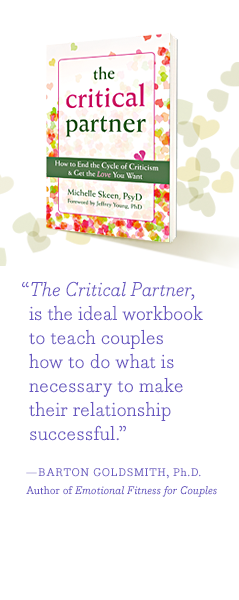Foreword by Jeffrey Young, PhD
It is a great pleasure to write this foreword to The Critical Partner. It is gratifying to read an excellent expansion of the schema therapy approach that can help so many people who are in painful, destructive relationships because they have partners who are highly critical of them.
A common issue among couples is criticism. I frequently work with couples in which one partner in the relationship is openly and consistently critical of the other (the “critical” partner). Over time this interaction has a destructive effect on the relationship, and on the well-being of the partner who is the victim of criticism (the “vulnerable” partner). Often both partners in a relationship become locked into a maladaptive, repetitive cycle that they don’t understand and find difficult to change.
This book first provides the reader with a way of understanding these destructive cycles through the concepts of schema therapy and the use of our assessment tools. Readers learn new and more effective strategies, based on schema therapy principles, to change the critical partner and to break their self-defeating patterns of interaction.
Using schema therapy as a framework, you will gain a deeper understanding of yourself, your partner, and the early childhood experiences in both of your families that shaped the relationship you are in. This deeper understanding of your own early maladaptive schemas, as well as those of your critical partner, will enable each of you to view the other with a level of compassion that you did not have before.
Michelle first presents case studies of couples that are in crisis as a primary result of the critical behavior of one partner. Each of the stories illustrates one of the five primary schemas of the critical partner. This is followed with assessment tools you can use to determine your partner’s schemas. This assessment process is informative and empathy-building. It highlights what I consider one of the real strengths of the schema approach: developing compassion for ourselves and others through understanding our early maladaptive schemas, and how they developed as a result of painful childhood and adolescent experiences.
The next section of the book presents case studies of the five primary schemas in the vulnerable partner, along with assessment tools to help you figure out your own primary schemas. Michelle then explains the importance of coping behaviors. Coping behaviors are responses to schema triggering events that we all develop as ways to protect ourselves when we feel we are under threat. However, in the long run, these coping behaviors cause harm to ourselves and to our partners.
The final two chapters deal with change. Michelle teaches new coping strategies you can use to deal with your schemas and with your partner in healthier ways. You will also learn how to react to schema triggering situations more effectively.
Changing our intimate relationships is not easy. Our emotions, beliefs, and behaviors began early in our lives and are now deeply entrenched. Nevertheless I am confident that readers of this book who have critical partners can make dramatic progress in improving their relationships by working hard to understand and then follow the principles outlined in this book. Doing this requires patience and compassion, but the payoff in improving your relationship will make all the effort you put in worthwhile.

